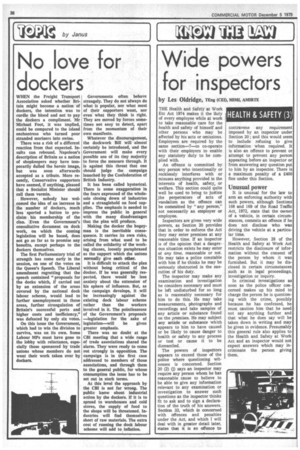No love for dockers
Page 40

If you've noticed an error in this article please click here to report it so we can fix it.
WHEN the Freight Transport Association asked whether Britain might become a nation of dockers, the intention was to curdle the blood and not to pay the dockers a compliment. Mr Michael Foot, it was implied, could be compared to the island enchantress who turned poor stranded mariners into swine.
There was a risk of a different reaction from that expected. Insults can rebound. Napoleon's description of Britain as a nation of shopkeepers may have temporarily dulled the heroic image, but was soon afterwards accepted as a tribute. More recently, Conservative supporters have seemed, if anything, pleased that a Socialist Minister should call them vermin.
However, nobody has welcomed the idea of an increase in the number of dockers, much less sported a button to proclaim his membership of the clan. Even the Government's consultative document on dock work, on which the coming legislation will be based, does not go so far as to promise any benefits, except perhaps to the dockers themselves.
The first Parliamentary trial of strength has come early in the session, on one of the votes on the Queen's Speech. The Liberal amendment regretting that the speech contained "proposals for the docks which, if carried out by an extension of the areas covered by the national dock labour scheme, would lead to further unemployment in those areas, further strangulation of Britain's successful ports and higher costs and inefficiency," was defeated by only six votes.
On this issue the Government, which had to win the division to survive, was on its own. Some Labour MPs must have gone to the lobby with reluctance, especially those sponsored by trade unions whose members do not want their work taken over by dockers. Governments often behave strangely. They do not always do what is popular, nor what most of their supporters want, nor even what they think is right. They are moved by forces sometimes not easy to detect, apart from the momentum of their own manifesto.
Whatever the discouragement, the dockwork Bill will almost certainly be introduced, and the Government will make every possible use of its tiny majority to force the measure through. It Is against this threat that one should judge the campaign launched by the Confederation of British Industry.
It has been called hysterical. There is some exaggeration In the fears expressed of the wholesale closing down of industries and a stranglehold on food supplies. The emphasis is needed to impress the public in general with the many disadvantages that the plan will produce.
Making the docker the bogeyman is the inevitable consequence. It carries its own risks, arising from what used to be called the solidarity of the working classes, loosely paraphrased as the support which the unions normally give each other.
It is difficult to attack the plan without being critical of the docker. If he was generally respected, there would be less anxiety about the extension of his sphere of influence. But, as the campaign develops, it will be increasingly against the existing dock labour scheme rather than the workers involved in it. The pointlessness of the Government's proposals —legislation for the sake of legislation—will be given greater emphasis.
There was no doubt at the CBI meeting that a wide range of trade associations shared the alarm. They were ready to come out strongly in opposition. The campaign is in the first case addressed to members of those associations, and through them to the general public, for whose consumption the Issue has to be set out in stark terms.
At this level the approach by the CBI is not far wrong. The public know about industrial action by the dockers. If it is to spread to warehouses and cold stores, the supply of food to the shops will be threatened. Industries will find themselves short of raw materials. The extra cost of running the dock labour scheme will add to inflation.


































































































































